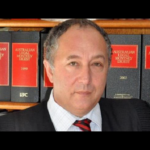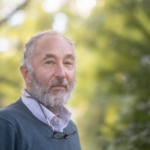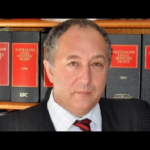“I Hope It’s Overturned”: Former Magistrate Heilpern on Revoking of Drug Driving Mistake Defence
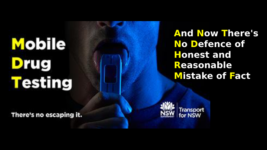
The drug driving regime in this state, as in the rest of the country, has always been controversial, as the testing model used, which ultimately sees people charged and lose their driver licence, doesn’t test for impairment levels, like drink driving, but rather tests for the mere presence of a drug.
The roadside drug testing devices used by police can detect tiny traces of only four select substances – cocaine, amphetamine, cannabis and MDMA – which means that people are found guilty of drug driving, even though at the time they were pulled over, they weren’t in an intoxicated state.
Due to this ability to detect small traces of a drug, countless cases have come before the courts, whereby an accused is permitted to argue the defence of honest and reasonable mistake to be driving with a substance in their system – think, second hand smoke from someone else’s joint.
And the use of this defence had been well established in case law over a number of years now.
However, that was until NSW District Court Judge Mark Buscombe ruled last month in Narouz versus R that, despite the defendant having stated that he had no idea how he tested positive for cocaine, the defence of honest mistake is not open to anyone who falls foul of drug driving laws in New South Wales.
A just ruling in an unjust system
Former NSW Magistrate David Heilpern broke new ground, when he found in 2016’s NSW Police versus Carrall, that a driver charged with cannabis driving was not guilty, which arose due to the defence of reasonable and honest mistake applying to his circumstances.
The case involved Joseph Carrall, who on being tested for drug driving on an earlier occasion, asked the attending officer the length of time one should wait after consuming cannabis to drive, and he’d been told a week. And on testing positive again, he informed the court that he’d waited nine days.
Heilpern allowed the defence. Indeed, at the time, Lismore Court, where he presided, was being overwhelmed by drug driving cases, with hundreds having pleaded guilty to the offence that results in automatic licence suspension, even though they’d consumed it long before testing or not at all.
In another 2016 case, his Honour was heard to remark that he’d read submissions in relation to cannabis driving charges, which outlined that positive readings had resulted from “passive smoking, eating hemp seeds, rubbing hemp balm or taking medicinal cannabis tincture.”
Absolute liability versus strict
Prior to the 26 July Narouz ruling, drug driving, contained in section 111 of the Road Transports Act 2013 (NSW), was a strict liability offence, which meant the prosecution didn’t have to prove a defendant’s criminal intent, and the defence of a reasonable mistake was open to the accused.
Yet, Judge Buscombe’s ruling has thrown proceedings around the section 111 offence into disarray, as he’s ruled that drug driving is an absolute liability offence, so the prosecution doesn’t have to prove an accused’s mental state, and the defence of honest mistake can’t be argued.
Sydney Criminal Lawyers spoke to Southern Cross University Dean of Law David Heilpern about the former magistrate’s opinion on how an absolute liability drug driving offence will affect communities in this state and his astonishment as to the path Judge Buscombe took in making such a judgement.
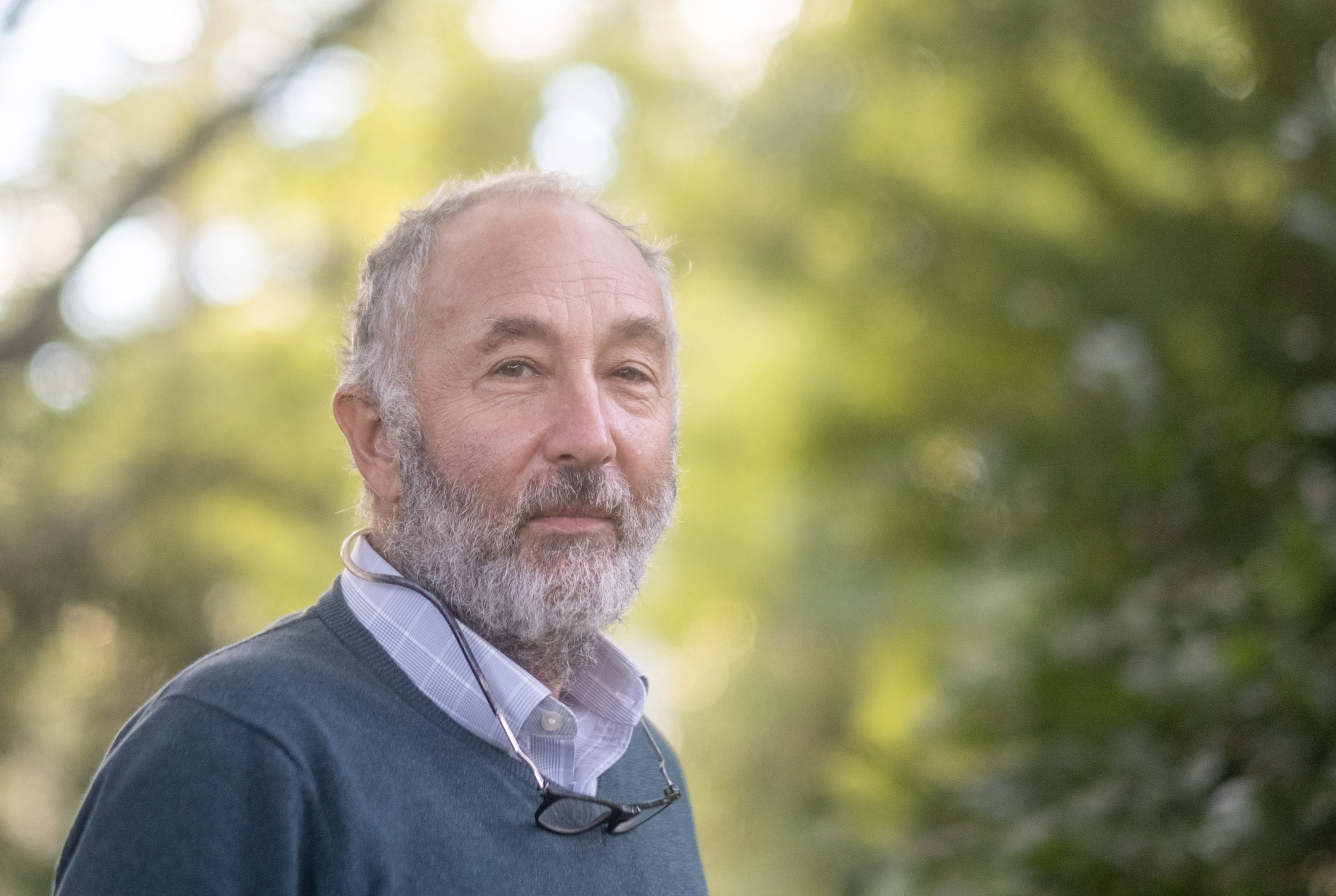
Mr Heilpern, just so we’re all on the same page, it was your 2016 ruling in NSW Police versus Carrall that set the precedent that drug driving is a strict liability offence?
Yes. But that was based on the decision in Mendolicchiu, which is mentioned in Buscombe’s decision.
So, the answer is yes, Carrall was the first one that applied it to drug driving, but it had been, since 2008, the law as it applies to low-range drink drive as well.
So, you based Carrall on the 2008 decision?
Correct. If the penalty regime is identical, as it is for low-range drink drive and drug driving offences, then it was a logical and, indeed, never questioned consequence, in the sense that you can’t have one without the other.
Buscombe’s decision has meant, in his view – and he said this straight out – that strict liability does not apply to drug driving or low-range drink driving because neither carry a prison term.
Take P-platers who have a zero-alcohol limit in NSW. If they were to cosume a slight bit of alcohol without knowing, previously they had a defence – because it was a strict liability offence – but now they don’t.
Similarly, if you were caught drug driving because of passive smoking, or because you have no idea how the drug got into your system, like in the Narouz case, then that defence is no longer available.
And if you’ve got one drop of alcohol or if you’ve got a detectable level of cocaine, no matter how it got in there, then you’re now guilty full stop.
So, before you officially set the precedent in Carrall, it was assumed that drug driving was a strict liability offence?
Correct. And there was a decision of another District Court judge, Judge Scotting, which is again mentioned in Narouz, where Scotting has said the defence does apply to drug driving.
So, you’ve got general acceptance, and two prior District Court authorities that make it clear. The order of cases is Mendolicchiu then Carrall, then Scotting’s ruling.
Considering your time on the bench dealing with drug driving cases, how do you consider the ruling Judge Buscombe handed down on 26 July?
For several reasons it’s extraordinary. And I hope it is overturned on appeal.
The first reason that it’s extraordinary is because I’ve never seen a case where the prosecution says the law is X and the defence says that the law is X, but the judge goes off on a frolic all of his own, and says, “No, no, no, the law is Y.”
I’ve never seen that before.
Secondly, it leaves magistrates in a very difficult position because there’s a question as to whether they choose to follow Buscombe’s decision or follow all the earlier decisions.
It’s a situation that can’t stand without either appellate court intervention or parliamentary intervention to fix it up, because it’s created a huge amount of uncertainty.
Hundreds, if not thousands, of cases of honest and reasonable mistake are run in NSW courts every year for fine only offences, like drive unlicenced or drive unregistered, where if you didn’t get your notice in the mail, and you honestly thought you were still registered, that defence is raised.
These defences have been run for decades and decades, and suddenly, a judge has thrown all of that up in the air, even though the prosecution didn’t ask them to and, of course, the defence didn’t ask them to.
So, I hope that there’s either parliamentary intervention or higher court intervention if there’s an appeal.
As we’ve just discussed, Carrall established that an accused could argue the honest and reasonable mistake defence.
Buscombe raised your ruling twice, pointing out that they contradicted his own, which all boiled down to interpretations of section 111(2)(a) of the Roads Transport Act.
Can you comment on this difference of opinion? What do you think about Buscombe’s interpretation compared to yours?
Naturally, I thought he was wrong, and I was right. And Judge Goldring was right in Mendolicchiu, and judge Scotting was right. As well, all the other judges and magistrates that have applied Carrall are right.
It doesn’t actually come down to interpretation of section 111. What it comes down to is an assessment of what the intention of parliament was with regard to this offence.
The only time an offence can be absolute is if there is a clear parliamentary intention because, as you can imagine, an absolute offence is pretty constraining.
It doesn’t give any room for honest and reasonable mistake of fact, and so, the rule of law is that it must be very clear that is what parliament intended.
I don’t think it’s clear at all that that’s what parliament intended. And not only that, but I can also point to my view and the view of the previous District Court judges as being correct, because since Mendolicchiu in 2008 and Carrall in 2016, parliament has done nothing.
If parliament was concerned at all about the availability of the defence, they would have jumped in. They would have changed it. If that had been their original intention, or their intention now, they would have said, “We’re not happy with this defence being run.
The case of Carrall garnished huge public attention – I’m sure you remember – and parliament elected to do nothing.
They haven’t amended legislation to make it an absolute liability offence, and nor did they do that with low-range drink driving after Mendolicchiu and nor did they do it after Scotting’s decision.
They sat there and said, “Well, that’s the interpretation, that must have been the intention, and let’s move on.”
Instead, what we have is a District Court Judge in this case saying, “No, no, no. Parliament’s intention, way back when they introduced the legislation, was for this to be an absolute liability offence.”
This despite they’re having done nothing to interfere with decades of assessment of it being a strict liability offence.
Having sat on the bench in Lismore Local Court, you were deeply disturbed by how drug driving laws were affecting those who came before you.
Indeed, the NSW Northern Rivers region, which includes Lismore, has long been a flashpoint of NSW police drug driving operations.
So, how do you consider the recent ruling will impact communities on the ground?
This is going to lead to net widening, in other words, many more people who previously would have been acquitted, will now be convicted of this offence.
At present in NSW, there are 250,000 drug driving tests every year. And about 8,000 people are caught with a detectable level of a drug, and those who have this defence available to them to lessen those numbers ending up in conviction will now certainly end up with a conviction.
No one is safe from this law now. We know that their ability to test for minute quantities is improving all the time.
Judge Buscombe accepted that if the strict liability offence was applied, he would have acquitted the person of the offence, but because he said it’s absolute, it doesn’t matter now if it is accidental or incidental or passive consumption or if the person has no idea how the cocaine, in this case, got into their system, they’re all now guilty.
This will lead to more sorrow and to more hardship for more people, with no gain in road safety whatsoever, and that is a tragedy for even more people. It means over-the-top laws apply.
We now have more drug driving, saliva tests in Australia than all the other countries in the world combined. We’ve gone mad with this testing.
And this judgement will only broaden the net to allow more people to suffer.
In July 2021, you launched the Drive Change campaign. NSW drug driving laws have been operating since 2007. Medicinal cannabis was legalised nationally in 2016. But no adjustment to the drug driving regime has been made since to reflect this.
As someone who’s spent their career working in the legal sector, how do you consider the state in continuing to punish patients who use cannabis medicine and drive?
Cannabis is the only prescription drug where there is a detection level offence. There is no detection level offence for barbiturates, benzodiazepines, opioids or antidepressants.
This is picking on medicinal cannabis users, as there’s absolutely no evidence of a road safety issue.
Tasmania does have a defence for those who are using cannabis in accordance with their prescription, and there has been no increase in the road toll as a result, and indeed, no one has suggested for a moment that those laws be changed.
That’s the same with many other places throughout the world, including the United Kingdom, Canada and many places in the United States.
So, we’re an outlier country in this regard, and the law should change, and it should change immediately.
We are now up to about 300,000 prescriptions a year for medicinal cannabis, and every one of those people, if they’re drivers, is running a gauntlet whereby they could lose their licence and get a criminal record, with everything that entails.
For rural and regional people, that often means losing their job, losing their house and losing contact with their family.
So, there’s a lot at stake here and the state government in NSW and all the other state governments around Australia should act and act rapidly.
There is legislation before the parliament in Victoria, in NSW and in South Australia to change these silly laws, and they should hop to and do it.
Currently, as you’ve just mentioned, there’s one bill before NSW parliament to establish a drug driving defence regarding the use of prescribed medicinal cannabis, and there’s another on its way.
The NSW parliament has knocked back attempts in the past to establish such a defence, and it’s not the only parliament in the country to have done this.
In your opinion, what possible explanation is there for this denial of what seems to be a very just law?
The explanation lies in three different areas:
The first is police in NSW and indeed, in most places in Australia, not Queensland at present, but most places in Australia, have opposed any form of drug law reform.
The police in NSW are paid per test, so to undertake this spoils their budget. And they use it as part of law enforcement, it’s not random. Even though that’s what the legislation says, they use number plate recognition to determine which cars they will pull over, more often than not.
So, the police oppose this, have consistently opposed it, and have done so in a position of conflict of interest.
The second people who consistently oppose these changes are pharmaceutical companies and the alcohol industry. You don’t have to be a brain surgeon to realise that the alcohol industry loves this system.
Imagine if alcohol had a zero limit. And we all know that it’s not just when you get to .05 that you’re a more dangerous driver.
So, the alcohol industry loves its current position as the lawful intoxicant that you can take. And it doesn’t want to give up its position and thus lose business.
Because, let’s face it, if there are more medicinal cannabis users, there will be less people abusing alcohol because a lot of people drink themselves out of pain or anxiety or PTSD, whereas they’re much better off using medicinal cannabis.
The third group who oppose medicinal cannabis are the pharmaceutical companies, and they do so because, obviously, if somebody is currently on some benzodiazepine or antianxiety medication, they can drive without being detected, but if the law changed, then people are going to shift away from those mainstream publicly subsidised drugs. They have a vested interest as well.
These three areas don’t help. But the most frustrating part of all are the road safety gurus, who suggest there is a positive link between medicinal cannabis users and road trauma or deaths or injuries or collisions.
They do so without one iota of evidence that there is any causative connection between medicinal cannabis users and increased road risk.
There is no study anywhere in the world. There is not a single finding from any coroner that a medicinal cannabis user in accordance with their prescription has caused a death or injury on our roads.
So, there are a lot of vested interests at play. But I suspect that we’re on the cusp of change.
Three hundred thousand prescriptions a year is a lot of police officers’ brothers and sisters, and it’s a lot of politicians’ aunts and grandparents.
There’s a huge number of people using medicinal cannabis now, and the public pressure is building towards changing this, despite the opposition of those quarters.
And just lastly, Mr Heilpern, in your estimate, how’s the Buscombe decision going to impact going into the future? Could this reframing of the section 111 offence as absolute liability continue?
It could. I am hopeful there will be an appeal. And I am hopeful that appeal will be successful.
I am also hopeful that parliament would say, “This cannot stand. We can’t have the District Court Judges disagreeing on such a fundamental issue: whether low-range drink drive or drug driving offences are absolute or strict.”
It will lead to an enormous amount of uncertainty in the legal system. Whether it’s considered absolute or strict will depend on which District Court Judge you get, and that can’t stand.
So, I’m hopeful that it will be overturned on appeal and if not, the parliament will intervene. And yes, it should open up discussion of the legitimacy and the justice inherent in drug driving offences.
You’re right that this has been before NSW parliament before, but that was in the face of the leadup to the last election.
For the Labor Party, it was a brave step at that time they just weren’t prepared to take, in case of any opposition from the police, pharmaceutical and alcohol companies and other really powerful agencies in our political system.
But they’re now coming up to the end of their first year of a four-year term, and the Greens and the Legalise Cannabis Party have the balance of power in the upper house.
So, I’m hopeful, for all of those reasons, that we might see change, and I certainly hope so for all those hundreds of thousands of cannabis users out there.


